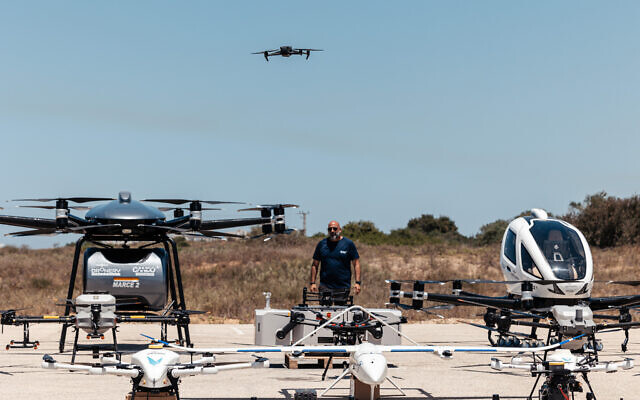Drone taxis take first test spin in Israel in bid to ease traffic congestion
As part of a government-led initiative, Israel prepares infrastructure for national airspace network of large drones that are designed to carry passengers and heavy cargo.

Israel has started test flights of autonomous aircraft that can carry passengers and heavy cargo as the country prepares its national airspace for air taxi transportation and multiple drone delivery services.
The first air taxi test flights conducted in recent days are part of a $24 million (AU) two-year government-led pilot project, also known as the Israel National Drone Initiative (INDI), which was originally established in 2019, to create a national drone network and prepare the sky for drone deliveries across Israel, together with regulators and private companies.
The overall aim of the project is to fly passengers and heavy cargo from one place to another and improve traffic congestion on Israel’s busy roads by using drones, as well as provide commercial and public services more efficiently.
“This is the first initiative of its kind in the world for an extensive and multidisciplinary examination of new technologies, including the transportation of cargo and later, people,” said Transportation Minister Miri Regev. “The collaborative project examines all the aspects – including regulation and legislative changes – involved in the commercial operation of drones, as an additional tool to deal with congestion.”
The initiative is a partnership between government entities led by the Transportation Ministry, the Israel Innovation Authority, Ayalon Highways Ltd., and the Civil Aviation Authority of Israel (CAAI).
As part of the second phase of the INDI project launched earlier this year, 11 drone operating and delivery companies were involved in tests and experimental flights throughout Israel last week.
For the first time, test flights of an autonomous flying vehicle, an electric vertical takeoff and landing (eVTOL) aircraft with long-distance capabilities were conducted in a managed urban airspace carrying heavy cargo loads, which in the future could transport people.
The Pardes Hanna-based startup called AIR flew its AIR ONE all-electric two-seater eVTOL, which can carry a total payload of up to 220 kilograms for a distance of up to 160 kilometres. It has collapsible wings for easy parking and can take off from or land on any flat surface and is suitable as an everyday alternative for short-distance commuting in the sky.
Dronery, a subsidiary of Israeli drone delivery fleet operator Cando Drones, for the first time operated demo flights of China’s Ehang two-seater air taxi drone which is being developed to carry passengers by Israeli air operators. The fully autonomous EH216-S aircraft can carry a total of up to 220 kilograms flying a distance within 30 kilometres using its intelligent command-and-control system.
Other Israeli companies involved in the INDI project are Airwayz Drones, a provider of AI-based systems for the smart management of drone fleets; High Lander, a developer of an uncrewed traffic management system (UTM) for drones; and Robotican, a developer of ground and air-based mobile autonomous robotic systems.
“The significance of these demonstrations lies in creating a regulatory sandbox that allows all relevant stakeholders to have practical experience before establishing a regulatory infrastructure that enables a wider economically viable model,” said Israel Innovation Authority CEO Dror Bin. “The ability of Israeli startup companies in the drone industry to experiment within this sandbox provides them with a competitive advantage in the global market.”
To safely deploy and monitor hundreds of drones operating in the same airspace as manned aircraft, the INDI initiative is also working on the development of a “system of aerial routes in the skies.” The system will allow different types of drones to fly simultaneously for various purposes, including healthcare, commerce, security, safety, and in the future passenger transportation. As part of this endeavour, the INDI project operates together with additional entities, including the Israeli Air Force, Israel Airports Authority Ltd., and local municipalities.
Israeli airspace is among the most tightly controlled and busiest relative to the country’s size. It has a lot of incoming and outgoing planes and at the same time, there’s a heavy military air presence, with planes and helicopters on the move both in training and on active duty.
Over the next two years, the participating drone operating companies in the INDI initiative will continue to conduct flights throughout the country for one week each month. The flights will take place in a controlled airspace throughout Israel covering long distances of up to 150 kilometres, while transporting heavier payloads, including, in the future, drones that will be able to carry people from one location to another. Ayalon Highways will serve as the pilot site for conducting the flight demonstrations.
“The aircraft being tested now will be able to bypass traffic jams, and ease congestion by removing cars and trucks from the roads in conjunction with air traffic management systems,” said Ayalon Highways CEO Orly Stern. “This will create a variety of air transportation options for regular and emergency cargo transfers.”

comments